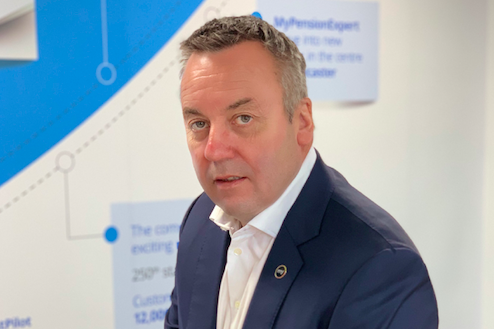By Andrew Megson, executive chairman, My Pension Expert
Even for the most experienced advisers, the practice of calculating risk can be incredibly complex. Assessing a client’s capacity to take risks numerically, while measuring this in accordance with their individual preferences can be a delicate balance to find.
But at the moment, this is more important than ever, and in the current climate, the prospect of adapting retirement finance strategies to maximise returns will be high on the agenda of wealth managers and clients alike.
Covid-19 has upended the financial strategies of many individuals, with volatile markets causing some pension investments to underperform. As such, many wealth advisers will find that their clients are looking to make up for these losses as quickly as possible.

Andrew Megson
According to recent research from My Pension Expert, this was the case for one in eight (13 percent) of individuals, who stated that they have moved part or all of their pension pot into a high-risk investment to boost its value.
Undoubtedly, most independent financial advisers will be well aware of the realities of taking such risks with a client’s portfolio, as well as the importance of doing so to avoid inflation.
That said, there are a few areas that are not so well traversed in the financial planning industry – in particular, the suitability of zero/low-liquidity investments to prospective retirees, as well as the importance of holistic planning.
Establishing objectives
It goes without saying that time and careful consideration must be spent in determining a client’s risk appetite when making investment decisions. Ultimately, good risk management will lead to good decision-making, so advisers should proceed cautiously when choosing which risks to take on behalf of a client.
This should always begin with ensuring that clients fully understand their capacity and appetite for risk, as well as the impact of higher-risk investments on their overall financial situation in retirement.
Before moving ahead with any new investments, advisers should ensure that clients have a sufficient level of financial awareness and engage in a thorough fact-finding process to assess their capacity for loss. If any loss of capital would seriously impact their standard of living, or peace of mind, then this should be taken into account when assessing the most suitable investment options.
In most cases, this will involve evaluating a client’s financial situation, as well as their investment preferences. Another point, and one which is often overlooked, is a client’s personal feelings about risk.
These could be influenced by a whole host of factors. For example, although a client may have excess savings and no financial dependents, they still might be unwilling to take risks, even though they have the capacity to do so.
In cases like these, it is vital to explain the net effect of inflation on their savings based on current interest rates, as well as the potential cost of living and long-term care as they age, and any inheritance they might wish to leave to family members in the future.
Of course, this information may not persuade a client to take on more risk. However, ensuring that they have all the information to hand will enable them to make the most informed decision about their pension investment strategy.
While it’s true that some of the riskiest investments often hold the potential for strong returns, they won’t be right for every prospective retiree.
Indeed, as the objective of most pension planners will be to maximize their pension pot and beat inflation, so that they are able to maintain a comfortable lifestyle throughout retirement, sometimes the risk might just outweigh the rewards. The key is to explain where and when risks can be appropriately taken.
Zero and low-liquidity investments
If a client is willing and financially able to move ahead with a riskier pension investment strategy after hearing all of the relevant information, the next step is to determine the type of investment to make on behalf of a client.
And of course, there are certain investments which could be more problematic for pension savers than others. Zero, low-liquidity and gated investments, for example, pose a number of risks to people, who may need to access their funds at late notice.
Although investing in illiquid assets such as real estate, classic cars, antiques, private company interests, art can be extremely profitable, they might not be suitable as a primary source of retirement income. These investments come with great risks, particularly in times of market turmoil, as clients will not be able to easily sell or access the cash tied up to the assets without the potential for losing a significant portion of its value.
For example, property funds are typically illiquid, largely because selling the property itself can be a long and drawn-out process. Consequently, many funds can also be gated – when investors are blocked from withdrawing money – in order to protect its value, so investors have no way of accessing their money.
So, even though many property funds have brought about strong returns for investors, their success is essentially pointless, if investors are unable to access their cash when they need to.
Of course, every investment presents an element of risk. However, it is vital to align these investment risks with the client’s individual objectives and risk profile. Ultimately, investments with weak liquidity will pose many risks for the majority of retirement planners, and clarity is of the utmost importance to enable pension planners to prepare for a financially secure retirement with confidence.
Andrew Megson is the Executive Chairman of My Pension Expert, an advised retirement income specialist. Founded in 2010, My Pension Expert specialises in providing independent advice to UK consumers about their pension plans – it arranges millions of pounds worth of retirement income options each week.







